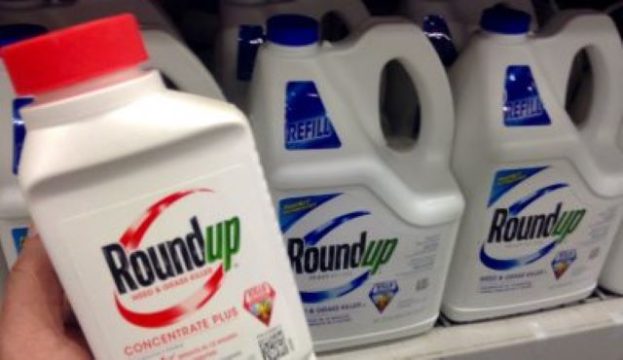27
Mar
Corporations Are Asked to Stand Up for Health and the Environment; Sell Organic Compatible Products

(Beyond Pesticides, March 27, 2023) In a move labeled “risk mitigation”—that is, mitigation of the risk to its shareholders—Bayer-Monsanto announced in 2021 that it would phase out Roundup™ products containing glyphosate for the residential lawn and garden market as of January 2023. In taking this action, Bayer-Monsanto is making no admissions, and glyphosate products will still be available to farmers. However, Lowe’s and Home Depot are still selling the glyphosate-based lawn and garden products.
Tell Lowe’s and Home Depot to eliminate Roundup™ and other toxic pesticides, promote organic practices, and sell organic compatible products.
In fact, since this is a voluntary reformulation, and Bayer-Monsanto has decided its own timing, the company cannot be held accountable to anything. The company could change its mind, and stores can continue to sell the glyphosate-based products as long as they want. And keep in mind that replacement versions of Roundup™ products are also toxic. Roundup® Dual Action, for example, contains the following active ingredients: triethylamine salt of triclopyr, fluazipop-P-butyl, diquat dibromide, and ammonium salt of imazapic.
Thus, Bayer/Monsanto announces that it is changing the formulation of Roundup and moving away from glyphosate, while continuing to sell Roundup™ products formulated both with and without glyphosate—leaving consumers unaware of their risks. The U.S. Environmental Protection Agency (EPA) has not taken any meaningful action to restrict glyphosate, and so we continue to see the threats to people and ecosystems associated with the chemical’s use. Of course, some of those who have been harmed by Roundup have secured large jury verdicts against Bayer-Monsanto for the harm inflicted and the Supreme Court, in failing to take an appeal from Bayer-Monsanto has upheld those jury verdicts. But glyphosate is the tip of the iceberg in a sea of toxic pesticides that have no place in our society. We know, for instance, that neonicotinoid insecticides have indiscriminately harmed pollinators, birds, and living organisms (terrestrial and aquatic) that are crucial to ecosystems that support life.
So, the alternative is to fiercely advance organic practices and hold responsible corporations to do the same. To do otherwise is to ignore the existential threat that petrochemical pesticides pose to health, biodiversity, and climate.
Letter to Lowe’s and Home Depot
In a move labeled “risk mitigation” — that is, mitigation of the risk to its shareholders — Bayer-Monsanto announced in 2021 that it would phase out Roundup™ products containing glyphosate for the residential lawn and garden market as of January 2023. In taking this action, Bayer-Monsanto is making no admissions. Lawn and garden glyphosate products will still be available if companies like yours sell it and until supplies are exhausted.
My understanding is that your stores still sell glyphosate-based lawn and garden products. As you know, Bayer-Monsanto’s decision on Roundup is a voluntary reformulation, and therefore the company has decided its own timing. I do not think that the continued sale of Roundup is responsible corporate behavior.
Please know that replacement versions of Roundup™ products are also toxic. Roundup® Dual Action, for example, contains the following active ingredients: triethylamine salt of triclopyr, fluazipop-P-butyl, diquat dibromide, and ammonium salt of imazapic—ingredients that are reproductive and developmental toxicants, sensitizers, and toxic to aquatic and other organisms.
When it comes to weeds, gardeners need good tools that enable them to control them with minimal effort and damage to their plants. Although gardeners differ in their preference for style of garden hoe, all must be sharp to operate efficiently, so files for sharpening should be located near the hoes, and customer service representatives should be prepared to demonstrate their use.
Weed-free and chemical-free organic mulches — such as straw or wood chips — are garden essentials for both weed control and long-term organic fertility. Speaking of fertility, natural fertility builds healthy soil for growing strong plants that resist insect and disease damage, while synthetic fertilizers kill valuable soil organisms. Healthy soils retain water and are especially helpful to plants in times of drought. Stores should stock fertility products approved for use in organic production.
We need to adopt practices in sync with nature that supports soil biology, cycles nutrients for plants naturally, retains moisture and water, and increases resiliency. Please:
- Remove Roundup from your stores now.
- Remove all toxic lawn and landscape pesticides from your shelves.
- Remove synthetic fossil fuel-based fertilizers.
- Fill your shelves with products compatible with certified organic products.
- Teach consumers of methods and products that support soil health, a clean environment, and vibrant landscapes.
See https://www.beyondpesticides.org/resources/lawns-and-landscapes/overview for more information.










